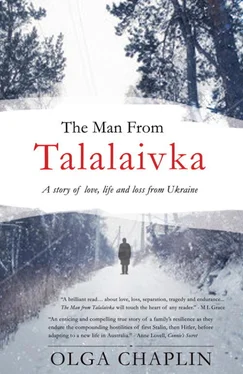The commandant adjusted his spectacles, glancing again at the women’s files, then looked more closely at his captives. The older woman, Evdokia, advanced in her pregnancy, was of a similar age to his own wife, who remained safely removed from this camp and the bombings, at their country estate with their children, with little risk of attack. He thumbed the papers of Evdokia’s file, murmured questions to the interpreter, who replied in muted tones. He removed his spectacles, wiped his eyes again, leaned back in his hard leather chair. Why would this pregnant woman, who had already been through so much, take the risk of leaving this camp, to travel even closer to Wilhelmshaven, where almost certainly the bombs would destroy her and her children? They had managed to survive the horrific journey from their village in eastern Ukraine: had survived the Allies’ bombs on the outskirts of Berlin at the camp hidden deep in the forest, where for some months she worked daily in the hidden munitions factory, and had only been removed with her husband and children just in time before the January air-raid carnage in Berlin, to be brought, miraculously safely, by train to this camp at Federwader.
His militarist’s mind told him punishment was in order. But his camp commandant’s logic gave a different answer. His superiors needed all the workers they could muster, in this crisis year. Their munitions factories and fire-fighting corps from captured countries had to continue. From the many thousands of prisoners in camps in the forests surrounding Berlin, relatively few were selected to make the train journey to this north-west coast of Germany, within reach of Wilhelmshaven. Their months of initial imprisonment and harsh conditions at that first camp had singled them out. Their ‘OST’ labels were removed from their jacket sleeves and they were given more food, and now were supervised in a camp without the massive barbed wire fences.
He sighed to himself, pondered thoughtfully. These prisoners must have stood at the gate that decided their fate. They must have somehow been trusted sufficiently to step to one side, walk past the infamous gate set by Himmler and his new civilian army that, at a whim, took the remainder of trapped prisoners to concentration and extermination camps.
He wondered, fleetingly, what his own wife would do in these circumstances. He could not be certain that she would have shown the loyalty, taken such high risks, to leave the relative safety of this camp, which saw fewer bombs flying over them, than the camp towards which these women were heading. Whoever these workers were, and from wherever they came, Germany needed every one of them. His own nation was being torn apart not just from one front, but now from three. Stalin’s armies had taken back the Ukraine, were even at the eastern borders of Germany’s satellite states. Italy had surrendered, entangling even more German troops to the south. And, just weeks ago, the Allies put into action their much-suspected ‘D-Day’ invasion, forcing Hitler’s last reserves of German men to bolster France’s western coastline. He could not stop the sense of foreboding hitting him. He instinctively felt his left leg, held together by long screws, the symbol of his recent dedicated duty as commander at the front line. He shuddered inwardly, hoping futilely that his young son, not yet fifteen, was not already being groomed to train in the army reserves.
He sighed, in pensive resignation, and glanced at the ambitious SS guard at his door. Himmler’s growing power over the administrative police of the Reich had grown so silently, yet so speedily, efficiently. Now, it seemed, these SS men could wield as much power as it suited them, often pushing the camp administrators into violent acts of reprisal against their prisoners.
“Gerhardt,” he calmly directed the guard, “you may take your break now… I will deal with this matter internally.” The young guard saluted, eager to be relieved. Meddling with these emotional women, crying before them, had left him feeling uncomfortable, in spite of his rigid training. Life in these low-security camps was confusing, unlike anything his army drills had prepared him for. These people, though different in some respects, and with their incomprehensible languages, were surprisingly like the villagers he had left behind in his own outpost hamlet.
The interpreter cleared his throat, carefully conveyed the commandant’s decision. “You must return to your barracks, and continue working in the munitions factory. You will receive your daily rations, as before. You will not be punished: on condition you do not attempt to leave this camp again. You must wait for news from your husbands… In any case, you must stay at this camp for your own safety. That is all. I do not expect to have you brought before me again. Do you understand this?”
Through her tears, Evdokia nodded. “Danke schon,” she whispered. She leaned against the table to steady herself, relieved. And she needed to know that Nadia and Mykola were safe.
“Oh Dynasha! Forgive me… I didn’t know we would cause such trouble!” Evdokia comforted her sobbing friend, who resigned herself to wait with her infant for Mikhaelo’s letters. She heard herself placating her friend. “Maria, don’t weep so, now. Your Mikhaelo will return to you, you will see… everything will go well.” She could not be so certain with her own husband, who she knew took greater risks than Maria’s.
Evdokia returned to her tiny space in the barracks building that was her family’s home these past many months. With each passing day since Peter was taken to his makeshift camp, closer to Wilhelmshaven and the increased Allied bombings, she lived in heightened anxiety. She feared she may never see her husband again. Remaining silent, she did not confide in her friends. But her deep fears were grounded in fact. The camps were strewn with forced labourers separated permanently in the chaos of Germany’s war, so many to never know what became of their loved ones. She could not tell herself, at that moment, as she looked about her and unpacked the suspect bag, what her plan would be. But she knew she had to act quickly, as each day brought greater numbers of air raids and destruction. And, in her distressed state, she could not be certain her pregnancy would reach full term.
* * *
She chose her day of escape carefully and watched the movements of the SS guards, then picked the time of their changeover shifts. The late afternoon was muted, with simple Sunday services following factory work. The children, lightly dressed, played at her side as she carried their jackets, on their permitted walk to the nearby woods, adjoining the railway.
She furtively checked the station for any guards. Fortune smiled on her, at that moment. The ticket attendant looked up at the quiet, neat woman who proffered the feniks for the journey. “Ah, Fraulein, off to Wilhelmshaven, eh? There will be little to find in the shops there these days, no?” he quipped as he gave her the ticket and change. “The train will come soon… they still come on time, just like the bombs, these days!” She smiled and thanked him, pretending to share his jesting. She found a wooden seat furthest from the ticket box, partly obscured by a bush, held her children close to her. She felt faint with exhaustion and the mounting tension, feared being recognised by the SS guards. She could not contemplate what would happen if she were caught again. “Please…” she silently pleaded into the darkening night, “let me reach my Peter safely.”
Twilight began to envelop them. She could not return to her camp now, even if she lost her nerve. The guards were on the look out for troublemakers, for partisans, working for the underground movement. By now, perhaps, she may even have been reported missing. She feared for her own unborn child, and her little children. But most of all, she feared she would never see Peter again. That pivotal thought forced her to remain on the hard wooden seat, her children folded close to her.
Читать дальше












